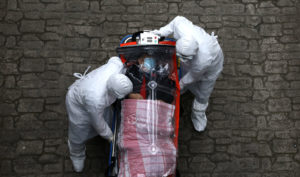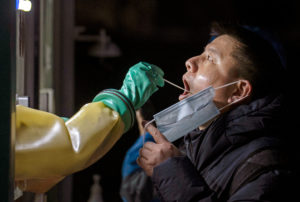In Nicaragua, Latin America’s third poorest country, people who don’t work don’t eat. Three-quarters of jobs are in small businesses or the informal economy. So when its first Covid case was diagnosed on 18 March 2020, Nicaragua’s President Daniel Ortega knew that shutting down the economy would be catastrophic.
He was under pressure from all sides to introduce strict restrictions. Among Nicaragua’s neighbours, El Salvador registered its first case on 18 March and imposed a lockdown two days later; Honduras did the same; Costa Rica imposed a lockdown on 16 March and three days later closed its borders completely. These neighbouring governments, all politically hostile towards Nicaragua, insisted that it join in closing the regional economy.
Within Nicaragua, vociferous opposition groups and media were also calling for the economy to be shut down. But the country had barely recovered from a violent confrontation in 2018 between these opposition groups and Ortega’s socialist Sandinista government, which had resulted in more than 200 deaths. A lockdown would only put further strain on the divided nation.
When Ortega declared publicly that there would be no lockdown, most Nicaraguans quietly accepted that while his decision might be risky, he had little choice. Inevitably, the Right-wing opposition accused him of being in denial about the pandemic. Worse still, they spread fear and suspicion with their predictions that the health service would collapse. An opposition thinktank projected 120,000 Covid cases by June; a local Right-wing media channel, 100% Noticias, topped that by saying that 23,000 Nicaraguans would be dead within a month. Once the government started producing Covid statistics, a rival “citizens’ observatory” was set up, which never declared its membership or source of funding. It began to produce weekly reports contesting the government’s figures (although the small print on its website reveals that its own statistics were based on social media reports and even “rumours”). Many Nicaraguans, including some I knew, were so scared of going to hospital when they developed Covid symptoms that they left it too late.
This dishonest narrative soon spread abroad, where Nicaragua’s opposition figures enjoy good contacts with the international media. On 4 April, BBC World claimed that the Ortega government had taken “no measures at all” against the virus threat. It invented a media trope: Ortega’s “long absence” from public view. Two days later, the New York Times asked “Where Is Daniel Ortega?,” saying that his government had been “widely criticised for its cavalier approach”. The Guardian joined the chorus, claiming that Ortega was “nowhere to be seen,” adding four days later that the “authoritarian” Ortega was one of four world leaders in denial about the virus. The Washington Post said that Ortega had “vanished,” leaving a government operating a “laissez-faire approach” to the pandemic. On 6 April, The Lancet published a letter calling Nicaragua’s Covid response “perhaps the most erratic of any country in the world to date”. By May, according to the New York Times, Nicaragua — “one of the last to reject the strict measures introduced globally” — had become a country of “midnight burials”.
The liberal media’s lies could not have been further from reality. Ortega’s government had prioritised health spending since he returned to power in 2007, raising it to 19% of the national budget by 2020, one of the highest levels in the world. Nicaragua was also one of the first nations in the region to set out its Covid strategy, issuing a joint protocol with the Pan-American Health Organisation (the Americas branch of the WHO) on 9 February. Its 36,000 health workers had received training on dealing with the virus before the first case arrived. One hospital was designated to deal solely with respiratory illnesses and 18 more were equipped with Covid isolation wards. Health “brigades” worked locally, eventually making five million house-to-house visits to educate people, identify possible Covid cases, and counteract misinformation. That’s about four visits per household on average.
So much for taking “no measures at all” against the virus. A “track and trace” system was in place and health checks were being made at border crossing points months before similar measures were taken in the UK or US. While tourism stopped and hotels and restaurants closed, many other businesses stayed open with precautions in place. Mask-wearing, never imposed by law, became almost universal. Private schools closed but public ones stayed open, with voluntary attendance, because many children rely on the free school meals served to every pupil.
What was the outcome? There was an intense peak of Covid cases and deaths between May and July 2020, but by August numbers were gradually falling, although they peaked again in mid-2021. My local hospital, one of the 19 equipped for Covid, was able to hold a small celebration in August 2020 for patients who had been discharged.
None of this early success dulled the criticism. The Lancet article praised the lockdown policies of El Salvador and Honduras. In the former, President Nayib Bukele forced people to self-isolate, offering a subsidy of $300 per family which caused massive, unregulated queues and then rowdy protests outside government offices. In some areas its lockdown was reportedly enforced by gangs with baseball bats. Meanwhile in Honduras, a “militarised quarantine” led to police violence, more than 1,000 arrests and the confiscation of almost 900 vehicles, according to human rights group COFADEH. Honduran schools stayed closed for two years. Yet both countries had higher reported infection levels than Nicaragua. So did Costa Rica, which sustained the fiercest barrage of criticism of its neighbour and for many weeks even prevented food transport between the two countries.
The international media didn’t question whether lockdowns were in Nicaragua’s best interests or whether they were even feasible. The truth only came out towards the end of the pandemic, when the World Health Organisation, The Economist and Amnesty International produced differing estimates of excess deaths related to Covid. All showed that, compared with the rest of Latin America (and indeed the UK and USA), Nicaragua had done relatively well. The WHO ranked its excess death level as 14th out of 19 countries in the region, better than all four of its immediate neighbours.
When it came to vaccines, Nicaragua was at first at a disadvantage as, unlike its neighbours, it received no early vaccine donations from the US or China. However, once supplies arrived via the WHO Covishield mechanism it advanced rapidly. Its community-based health teams have ensured that 86% of the population is fully vaccinated, the highest rate in Central America, and 91% have had at least one dose. This was all achieved without the coercive vaccine mandates of many Western countries.
By refusing to lock down, President Ortega saved his country from economic disaster. Nicaragua’s economy has recovered swiftly from the pandemic, with GDP growing by more than 10% in 2021 and forecast to be 4% this year. The government resumed its investment programmes, and now has 24 hospitals built or nearing completion as well as investing in renewable energy, paving rural roads, remodelling schools, and achieving the highest level of electricity coverage in the region.
Latin America’s experience of Covid was hugely diverse: Brazil, Mexico and Peru were — like the UK and US — among the 20 countries with the highest levels of Covid-related deaths. By contrast, according to Johns Hopkins University, Nicaragua had one of the lowest death rates per 100,000 population in the world — 189 compared with 276 for the UK and 374 for the US. But the international media have done nothing to redress the unbalanced reporting of the early months of the pandemic. To date, no one has asked why Nicaragua’s performance was better and what might be learned from its experience. It would be worth finding out before the next pandemic.
***
John appears on this week’s Collateral Global podcast.
Disclaimer
Some of the posts we share are controversial and we do not necessarily agree with them in the whole extend. Sometimes we agree with the content or part of it but we do not agree with the narration or language. Nevertheless we find them somehow interesting, valuable and/or informative or we share them, because we strongly believe in freedom of speech, free press and journalism. We strongly encourage you to have a critical approach to all the content, do your own research and analysis to build your own opinion.
We would be glad to have your feedback.
Source: UnHerd Read the original article here: https://unherd.com/



